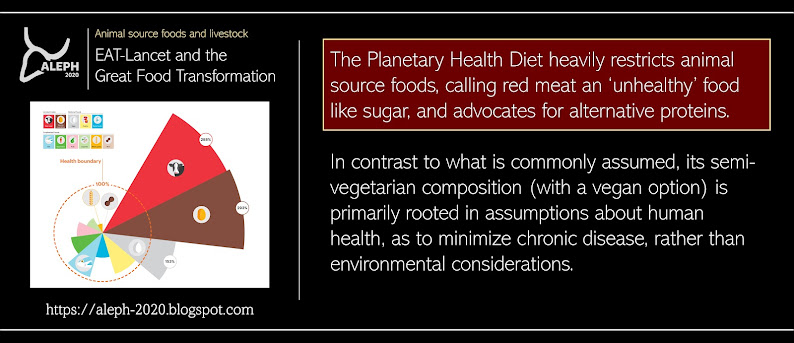
Agri-food scientist
+ CDP activist
(Common sense,
Decency &
Pragmatism)
Tweets reflect my own views
32 subscribers
How to get URL link on X (Twitter) App


 NOVA poses an existential threat to the business model of agrifood conglomerates, companies whose combined revenues dwarf the GDP of many nations. The core of their profitability lies in the very products that NOVA identifies as inherently harmful: ultra-processed foods (UPF).
NOVA poses an existential threat to the business model of agrifood conglomerates, companies whose combined revenues dwarf the GDP of many nations. The core of their profitability lies in the very products that NOVA identifies as inherently harmful: ultra-processed foods (UPF). 

 It is time for dietary guidelines to move beyond such reductionist thinking, emphasizing broader dietary patterns and individual health contexts rather than fixating on specific nutrients.
It is time for dietary guidelines to move beyond such reductionist thinking, emphasizing broader dietary patterns and individual health contexts rather than fixating on specific nutrients.

 With the growing prevalence of mental and neurological disorders in today's society, it is crucial to examine whether deficiencies in these compounds could contribute to such conditions.
With the growing prevalence of mental and neurological disorders in today's society, it is crucial to examine whether deficiencies in these compounds could contribute to such conditions.

 By examining the evolutionary trajectory of the Homo lineage, we gain valuable insights into the foods and dietary patterns that have supported our survival and development, particularly the critical role of meat and animal fat.
By examining the evolutionary trajectory of the Homo lineage, we gain valuable insights into the foods and dietary patterns that have supported our survival and development, particularly the critical role of meat and animal fat.

 EAT-Lancet and the World Economic Forum
EAT-Lancet and the World Economic Forum

 Infants born to macrobiotic or vegan mothers risk low birth weight, nutrient deficiencies & worse: failure to thrive, rickets, hyperparathyroidism, anaemia, neuropathy, psychosis, lethargy, spinal cord degeneration, cerebral atrophy, optic, ...
Infants born to macrobiotic or vegan mothers risk low birth weight, nutrient deficiencies & worse: failure to thrive, rickets, hyperparathyroidism, anaemia, neuropathy, psychosis, lethargy, spinal cord degeneration, cerebral atrophy, optic, ...
 Situating the problem:
Situating the problem:

 "Our findings suggest that globally the key to a healthy diet is probably one that includes diverse natural foods in moderation, rather than restricting intake to a small number of food categories."
"Our findings suggest that globally the key to a healthy diet is probably one that includes diverse natural foods in moderation, rather than restricting intake to a small number of food categories."

 But different "wants" are not interchangeable.
But different "wants" are not interchangeable. 

 Could it be because it isn't about red meat as such, but -for instance- about how people prepare meat, or how they insert it in dietary patterns? Or could it be that a "healthy user bias" disfavours meat in the US (where eating meat comes with moral overtones), but not globally?
Could it be because it isn't about red meat as such, but -for instance- about how people prepare meat, or how they insert it in dietary patterns? Or could it be that a "healthy user bias" disfavours meat in the US (where eating meat comes with moral overtones), but not globally? 

 The book kicks off with general descriptions ("the frustrated" who are "intensely discontented yet not destitute"), but gets more specific in the later sections. Being discontent is not enough. They must have access to power, a poor sense of practical reality, & a doctrine.
The book kicks off with general descriptions ("the frustrated" who are "intensely discontented yet not destitute"), but gets more specific in the later sections. Being discontent is not enough. They must have access to power, a poor sense of practical reality, & a doctrine.

https://twitter.com/newscientist/status/1655878433585393668
 And then we're not even talking about what this would look like if we'd also account for the actual contribution to further warming (GWP versus GWP* metrics).
And then we're not even talking about what this would look like if we'd also account for the actual contribution to further warming (GWP versus GWP* metrics).
 BANS - do not rely on consumer behaviour - force them into compliance and stigmatize the dissidents.
BANS - do not rely on consumer behaviour - force them into compliance and stigmatize the dissidents. 

 "We’re all speaking in this newspeak of percentages & abstractions in an attempt to validate our worldview & obfuscate our complicity in the mess we’re all in. No one can seem to agree on the numbers, yet without wielding them, our worldview is considered backwards & ignorant"
"We’re all speaking in this newspeak of percentages & abstractions in an attempt to validate our worldview & obfuscate our complicity in the mess we’re all in. No one can seem to agree on the numbers, yet without wielding them, our worldview is considered backwards & ignorant"






https://twitter.com/GOALSciences/status/1640409574720061449
 What do you say, tweeps? Rabbits🐰 are:
What do you say, tweeps? Rabbits🐰 are: